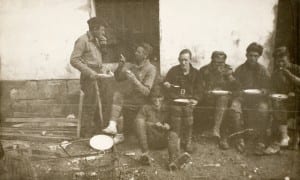Sex and the Somme
By Ben Stevens H P Stevens, on 26 June 2014
As the First World War centenary commemorations continue apace, there is a risk that inconvenient truths about the war will be quietly airbrushed from the official record.
One particular area that some may like to ignore is the use of brothels by British troops or ‘Tommies’ while in France and Belgium.
Dr Clare Makepeace (UCL History) made it the focus of her lecture ‘Sex and the Somme’ on 18 June, which was the first in a new series of First World War –themed Lunch Hour Lectures on Tour at the Guardian’s London offices.
She began by explaining how when the Tommies set off, each one was dispatched with a message from Lord Kitchener folded into their pay books. In it, he reminded them that the honour of the British Army depended on their conduct and warned them to “be on guard against excesses” especially “temptations both in wine and women” and to “avoid any intimacy”. (more…)
 Close
Close





